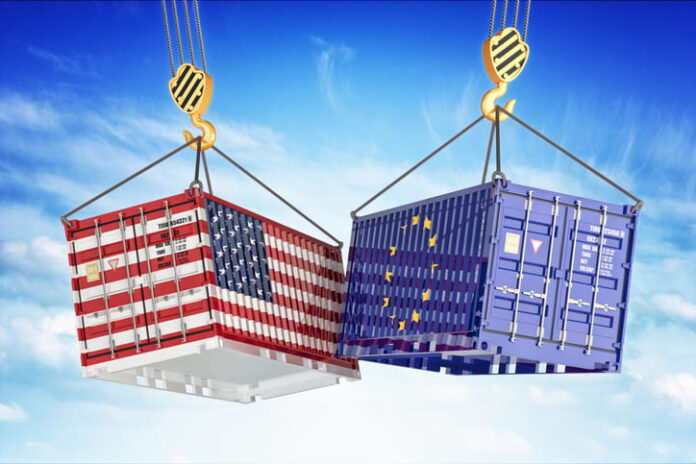
By Emil Bjerg, journalist and editor
President Donald Trump continues to dramatically reshape the American and global political landscape. Saturday evening, the American president imposed tariffs on 25% on goods from Canada and Mexico, with a lower rate of 10% for Canadian oil, and an added 10% on imports from China. These are substantial tariffs on the US three biggest trade partners.
Monday, Trump and the Mexican President, Claudia Sheimbaum, announced a one-month break on the US tariffs toward Mexico. The truce happened after Sheinbaum agreed to deploy 10,000 national guards to help prevent drug smuggling from Mexico to the US.
As of this writing, the tariffs are still in place for Canada and China. The new import taxes have sparked concerns over inflation and falling stock prices. We’ll return to the economic implications after a global overview of the situation.
Countermeasures
This could mark the beginning of a new era of protectionism and trade wars, as both Canada, Mexico, and China have announced countermeasures.
Canada’s Prime Minister, Justin Trudeau, has announced and partially implemented retaliatory measures of 25% tariffs. The tariffs will be rolled out in two stages with immediate tariffs targeted at consumer products like orange juice, peanut butter, wine, spirits, beer, coffee, apparel, and cosmetics. China has pledged to lodge a complaint with the World Trade Organization and also announced it will implement “corresponding countermeasures“.
These countermeasures come despite Trump’s warning that he could expand the scope of tariffs imposed on the three countries if they retaliate.
Tariffs against the EU?
President Donald Trump also escalated his rhetoric regarding potential tariffs on the European Union. Trump stated that new tariffs against the EU will “definitely happen”, adding that “the European Union has treated us terribly”. Trumps cites concerns over the trade deficit and what he perceives as insufficient EU imports of American cars and agricultural products as his reason to impose tariffs.
The UK, on the other hand, appears to be weathering the tariff storm, with Trump speaking positively of his British colleague, Keir Starmer.
The European Commission has expressed regret over Trump’s decision to impose tariffs on Canada, Mexico, and China and warned of retaliation if the EU is targeted. A spokesperson from the European Commission said that “the EU would respond firmly to any trading partner that unfairly or arbitrarily imposes tariffs on EU goods.” In a similar tone, French President Macron said “If we are attacked in terms of trade, Europe – as a true power – will have to stand up for itself and therefore react”. Macron also noted that the new Trump administration will “push Europeans to be more united.”
As of this writing, Trump has not yet imposed tariffs on EU countries, though he has said that they will be implemented “pretty soon”.
Concerns Over Trade War Drives Declining Stocks
Monday morning, the global stock markets opened with considerable losses following the weekend’s announcements. Asian and European markets opened to declines between 1 and 2.7 percent while the American S&P 500 futures had declined by 1.5% by the time of writing. Car companies from Asia, Europe, and the US saw their stocks particularly affected, with declines of 5 to 7.5 percent across the three continents. This could be just the beginning.
Market analysts attribute this widespread decline to concerns over the potential escalation of a trade war. Russ Mould, investment director at AJ Bell, told the BBC that there is a “sea of red flashing on the markets”. The import taxes could result in “higher inflation and put a stop to further interest rate cuts for the time being – exactly the opposite of what equity investors want to happen”, he added.
Trump’s Economic Gambit
With the tariffs, Trump has thrown himself into one of the biggest gambits of his political career.
As CNN writes, “The looming import taxes on Mexico, Canada and China will be a major test of Trump’s unorthodox use of tariffs, which he’s described as “the greatest thing ever invented.”
The Wall Street Journal has another view in a stark criticism of the import taxes calling it “The Dumbest Trade War in History”.
The tariffs are a gamble that could define Trump’s presidency and see substantial parts of his political support falter: they will likely drive American inflation and could result in a loss of jobs, in the US as well as in the global economy. Mary Lovely, a fellow at Peterson Institute International Economics, calls the move “a huge gamble. It’s a recipe for slowing down the economy and increasing inflation.”
Aforementioned Russ Mould from AJ Bell affirms: “”Higher prices could hurt demand, and there might be a trickle-down effect that knocks business and consumer confidence and feeds into weaker economic activity.”
As the global economy grapples with the implications of Trump’s new tariffs, the coming weeks and months will reveal the long-term effects of Trump’s economic gambit.
#Tariffs #Canada #Mexico #China #Trump